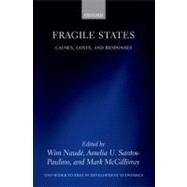Fragile States Causes, Costs, and Responses
, by Naude, Wim; Santos-Paulino, Amelia U.; McGillivray, Mark- ISBN: 9780199693153 | 0199693153
- Cover: Hardcover
- Copyright: 11/1/2011
Overcoming state fragility is one of the most important international development objectives of the 21st century. Many fragile states have turned into failed states, where millions of people are caught in deprivation and seemingly hopeless conditions. Fragile states lack the authority, legitimacy, and capacity that a modern state needs to advance the development of its peoples, and present deep challenges for the design and implementation of development policy. For instance, how is aid to be designed and delivered in a way that will help people in fragile states if their governments lack capacity to absorb and use aid? And what can be done about adverse side-effects of fragile states on their neighbours and the global community, such as heightened insecurity, rising out-migration, displaced populations, and the destruction of natural resources? This book documents the far reaching global repercussions of state fragility and provides a timely contribution to the international discourse on three dimensions of fragile states: their causes, costs, and the responsesrequired. It will appeal to scholars, policymakers, and donors who are concerned about conflict and development. Its aim is to contribute to our understanding of how strong and accountable states can be fostered-states where government and civil society progressively advance human wellbeing, underpin households' resilience in the face of shocks, and form effective partnerships to maximize the benefits of development assistance.







